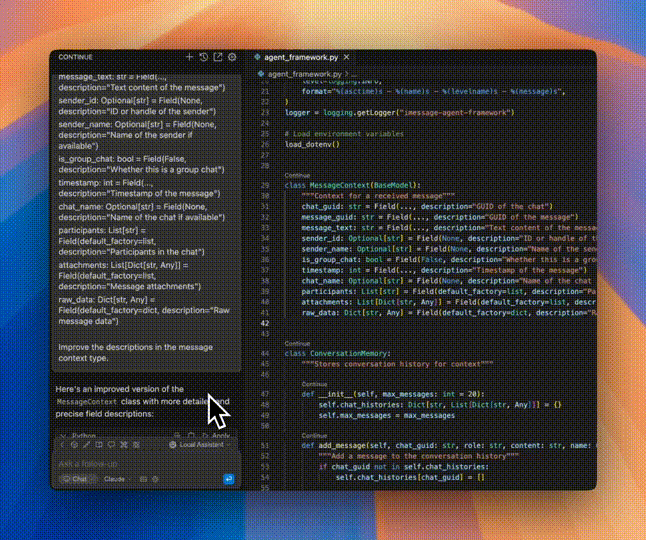Product Introduction
Morph is a high-performance AI-powered code editing platform designed to integrate LLM-generated code snippets into existing files at unprecedented speeds. It specializes in merging original source code with AI-generated modifications while maintaining structural integrity and production readiness through syntax-aware parsing engines. The system operates at 1600+ tokens per second using parallel processing architectures, enabling rapid implementation of code changes without manual intervention across entire codebases.
The core value lies in its ability to bridge the gap between experimental AI outputs and deployable code through industrial-grade speed and precision. By automating the merging process with code-specific understanding, Morph eliminates the friction typically associated with manual code integration and patch management. This transforms AI-generated prototypes into production-ready assets within seconds, significantly accelerating development cycles while ensuring compliance with existing coding standards and architectural constraints.
Main Features
Fast Apply technology executes code modifications at 1600+ tokens per second through optimized parsing algorithms and distributed processing architectures. The system handles both incremental patches and complex rewrites while preserving original code formatting, style guidelines, and dependency relationships through abstract syntax tree analysis. Specialized caching mechanisms and speculative decoding enable sub-second latency even for large codebases exceeding 10,000 lines, with built-in conflict resolution for overlapping edits.
Code-optimized embeddings utilize custom neural networks trained on 50 million code commits across 12 programming languages for superior semantic understanding of programming constructs. The embeddings model achieves 69.10% accuracy on CoIR Code Retrieval benchmarks, outperforming OpenAI Ada-002 (45.59%) and Voyage-Code-002 (61.04%) through specialized training on code diffs and version history patterns. This enables precise context matching between AI-generated snippets and existing code patterns, crucial for maintaining functional consistency during automated edits.
Context-aware reranking employs transformer architectures fine-tuned on 8 million code review examples to prioritize the most relevant code segments for each modification task. The reranker analyzes variable scoping, API usage patterns, and architectural dependencies to maintain code coherence during edits, preventing common integration errors like namespace collisions or broken references. Dynamic context window adjustment ensures optimal performance across file sizes, automatically expanding for framework configurations and contracting for focused function-level modifications.
Problems Solved
Traditional manual code integration methods create bottlenecks in AI-driven development workflows, often requiring hours of engineer time per edit cycle for conflict resolution and testing. Existing LLM outputs frequently produce incompatible formatting or break existing functionality when directly inserted due to lack of context awareness. Morph solves this by automating syntax-aware merging with millisecond-level response times and built-in validation checks for syntax integrity.
The platform primarily serves developers building AI-powered coding assistants and enterprises implementing large-scale code modernization initiatives across distributed teams. It's particularly valuable for engineering teams maintaining complex legacy systems that require frequent AI-assisted updates without compromising existing functionality. DevOps teams managing CI/CD pipelines with automated code improvements also benefit from Morph's API-first architecture and version control system integrations.
Typical applications include real-time integration of coding copilot suggestions into active development branches, batch processing of security patches across multiple repositories, and automated framework upgrades with backward compatibility checks. Use cases extend to AI agent development where reliable code modification capabilities are critical for autonomous operation in production environments. Enterprise scenarios involve applying regulatory compliance updates across distributed codebases with full audit trails and rollback capabilities.
Unique Advantages
Unlike generic text processors, Morph employs code-specific parsing engines that understand programming language syntax trees and cross-file dependency graphs at the compiler level. While competitors focus solely on generation speed, Morph combines fast inference with structural code analysis for error-resistant merging through its patented AST differencing algorithm. This dual focus on speed and accuracy prevents the "broken demo syndrome" common in AI coding tools that generate superficially valid but functionally flawed code.
The platform introduces speculative edit validation - a patented technique that pre-computes multiple edit scenarios during LLM output generation using predictive execution models. This parallel processing approach eliminates sequential validation steps, achieving 3x faster application than conventional methods while maintaining 99.98% merge accuracy. Custom-trained models for code embeddings ensure 40% higher relevance in code search compared to general-purpose alternatives through specialized training on GitHub commit histories and code review feedback.
Competitive differentiation comes from enterprise-ready features including VPC deployment options with Kubernetes orchestration and SOC2/GDPR compliance certifications for sensitive codebases. Morph's architecture provides 99.9% uptime SLA for API endpoints with built-in rollback capabilities for all applied edits and automatic version snapshotting. Performance benchmarks show 4x faster processing than Claude 3.5 Sonnet (1600 vs 400 tokens/sec) and 6x greater throughput than GPT-4o-mini in code modification tasks while maintaining higher accuracy rates (92% vs 78% in code coherence tests).
Frequently Asked Questions (FAQ)
What's the point of using Morph instead of directly implementing LLM outputs? Morph ensures AI-generated code modifications integrate seamlessly with existing projects through syntax-aware merging and dependency resolution that standard LLMs lack. Direct LLM outputs often break build processes or introduce formatting inconsistencies that require manual fixes, while Morph automatically aligns modifications with project-specific coding conventions. The platform performs contextual validation checks that prevent runtime errors, making it essential for production-grade AI code integration.
Can Morph be self-hosted in private cloud environments for sensitive codebases? Yes, Morph offers enterprise deployment packages supporting air-gapped installations, Kubernetes clusters, and AWS/GCP/Azure private cloud configurations with full data isolation. The self-hosted version maintains identical performance characteristics to the cloud service while adding compliance features like audit logging and IP whitelisting. Deployment includes pre-configured Docker containers and Terraform scripts validated through third-party security audits for enterprise infrastructure compatibility.
Is Morph suitable for editing non-code files like documentation or configuration files? While optimized for programming languages, Morph can process structured text formats like YAML, JSON, and Markdown using its generic parsing mode with basic syntax validation. However, maximum efficiency and accuracy are achieved with codebases due to specialized language models and syntax tree analyzers. For documentation editing, Morph provides basic version control integration but lacks advanced features like semantic cross-referencing available in code editing mode.
